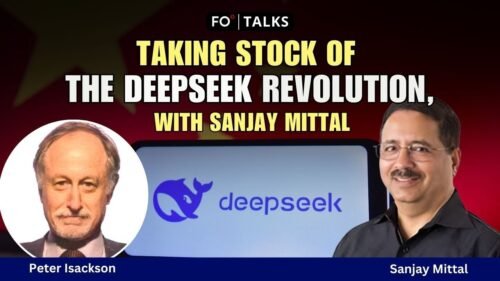Fair Observer Founder, CEO & Editor-in-Chief Atul Singh and Jason Ward, founder and principal analyst at the Center for International Corporate Tax Accountability and Research (CICTAR), discuss how multinational corporations shift profits to avoid taxes, and the resulting consequences for governments, markets and public services. Ward emphasizes that these avoidance schemes are not sophisticated — they’re “simple tricks” that deprive countries of revenue needed for infrastructure, health, education and legal systems. As a result, essential public goods are underfunded while inequality deepens. This hollowing out of national budgets affects not just developing countries but also wealthy ones, limiting their capacity to respond to crises, invest in the future or compete economically.
Microsoft and Ireland: windfall gains from past loopholes
Ward highlights the technology titan Microsoft as a central case study, pointing to a nearly $30 billion audit by the Internal Revenue Service — the largest of its kind. Historically, Microsoft routed massive revenues through Ireland while paying very little tax, exploiting a now-defunct loophole where companies could claim tax residency in jurisdictions like Bermuda while operating legally in Ireland. This practice was widespread among US tech giants and made Ireland a magnet for profit-shifting activity.
But recent global tax reforms have shifted this dynamic. Ireland’s closure of schemes like the “double Irish Dutch sandwich” and its increase of the corporate tax rate from 12.5% to 15% — in response to the Organization for Economic Co-operation and Development (OECD)’s Pillar Two minimum tax agreement — now force companies like Microsoft to pay significantly more tax, even on revenue not generated in Ireland. These windfall revenues are helping Ireland establish a sovereign wealth fund, though Ward warns the gains may be short-lived; companies may adapt and reroute profits elsewhere once new workarounds are found.
Starbucks and Switzerland: fictional coffee trade
To illustrate another strategy, Ward discusses the coffee company Starbucks’s operations in Switzerland. Since 2011, every green coffee bean Starbucks purchases is, on paper, bought and resold through its Swiss subsidiary, Starbucks Coffee Trading Company SRL, with an 18% markup. This markup, taxed at low Swiss rates, shifted an estimated $1.3 billion in profit from consumer markets like the United States and China to Switzerland. The trade is “purely fictional” — the beans never physically enter Switzerland. The entire transaction is constructed on paper, allowing Starbucks to reap massive tax advantages while governments in actual sales markets lose out.
This “very clever accounting trick” is widespread in global commodities and results in the systematic extraction of tax revenues, even from some of the world’s poorest countries. Global commodity hubs like Switzerland are designed to provide such fiscal advantages to corporations, making them complicit in the erosion of global tax bases.
Uber and the Netherlands: IP and artificial debt
Ward turns to the transportation service Uber to demonstrate how companies use intellectual property and debt structures to shelter profits. Uber, which defines itself as a tech company, directs global customer payments to a Dutch entity, returning only the driver’s share. After shifting its intellectual property (IP) from Bermuda to the Netherlands through a fictional transaction, Uber created large volumes of internal debt, allowing it to minimize its tax obligations. The Dutch entity essentially “buys” the IP, creating debt on its books, which can then be used to write off future profits as interest payments.
Uber has processed more financial flows through the Netherlands than even JPMorgan Chase Bank. Similar tactics are used by other firms, namely the online streaming company Netflix and the fast food titan McDonald’s. Particularly, companies in IT and pharmaceuticals can easily manipulate the location and value of IP assets. These industries are ideal for profit shifting because their key value drivers — algorithms, branding or molecular formulas — are intangible and easy to relocate on paper.
Big Pharma: public subsidies, private gains
Ward scrutinizes pharmaceutical companies like Merck and Pfizer for benefiting heavily from public spending and subsidies while reporting minimal tax liability. By housing patents in low-tax jurisdictions like Ireland, Switzerland or Bermuda, these firms book profits in favorable locations while avoiding tax in the high-revenue US market. Despite massive public subsidies for research and development and government drug purchases, Merck, for instance, reported a global profit of $20 billion but a US loss of $1.8 billion — effectively paying no tax domestically. The Senate Finance Committee and even US President Donald Trump have scrutinized this practice.
Ward also cites biotech company CSL, which claimed its Swiss workforce generated ten times the profit of its Australian employees. This shocking statistic raised eyebrows during debates over new tax transparency laws.
The pattern across Big Pharma is clear: Governments fund the science and purchase the drugs, while the companies siphon profits offshore. This double-dipping — benefiting from public support while dodging tax — undermines both fiscal responsibility and public trust.
Transparency and reform: global efforts gain traction
Ward outlines reform efforts aimed at halting the global “race to the bottom.” Australia has passed groundbreaking tax transparency laws requiring multinationals to disclose key financial data — revenues, profits, taxes paid and employee numbers — in known tax havens. This initiative, though not exhaustive, sets a new global benchmark. It also builds on Australia’s ten-year push for public accountability, driven by citizen awareness campaigns and investigative journalism.
CICTAR has also filed shareholder resolutions demanding country-by-country reporting, including one at Merck that received 23% support despite opposition from management and proxy advisors. The European Union has implemented a similar framework, though with more loopholes and limited jurisdictional reach.
These reforms represent a growing consensus that transparency is essential for meaningful enforcement. Without it, governments remain blind to how much revenue is being lost and where.
Toward a fairer global system
Fortunately, tax laws are seeing several hopeful developments. The US Financial Accounting Standards Board (FASB) is pushing for greater corporate tax disclosure. China is also taking a harder stance on tax avoidance, including by multinationals. This change potentially positions the country as a constructive player in global reform.
The momentum for global tax coordination is shifting from the OECD — a body Ward criticizes as favoring wealthy nations — to the more democratic United Nations. Although UN processes are slower and messier, they offer more space for regional cooperation and developing-country influence. This shift could be transformative if emerging economies work together to demand fairer treatment and tighter standards. Ward acknowledges the institutional challenges within the UN but believes its legitimacy and broader participation make it a more just venue for negotiating rules that affect all nations, not just the most powerful.
He remains skeptical about the future of OECD’s Pillar One plan, which targets large tech firms like Google and Microsoft. He notes that unilateral digital services taxes initially created enough pressure for companies to seek multilateral solutions. But if Pillar One fails in the US Congress, those unilateral measures may return. He warns that Trump’s approach of defending the US corporations’ ability to dodge taxes is short-sighted and undermines US tax revenue. This stance weakens the global tax system and deprives Americans of the revenue needed to fund critical services and infrastructure.
The case for transparency and fairness
Ward insists that transparency is primarily about competitiveness and innovation. Companies should succeed by offering better products, services and ideas, not by exploiting tax loopholes. Dominant firms that avoid taxes distort competition and entrench monopoly power, while smaller businesses are left at a disadvantage.
For investors, unions and citizens alike, robust transparency is key to building smarter markets and healthier economies. A more accountable tax system is essential to creating a fairer global order. Tax justice is not a fringe concern — it’s a foundational issue for economic development, democratic governance and global equity.
[Lee Thompson-Kolar edited this piece.]
The views expressed in this article/video are the author’s own and do not necessarily reflect Fair Observer’s editorial policy.











































Comment